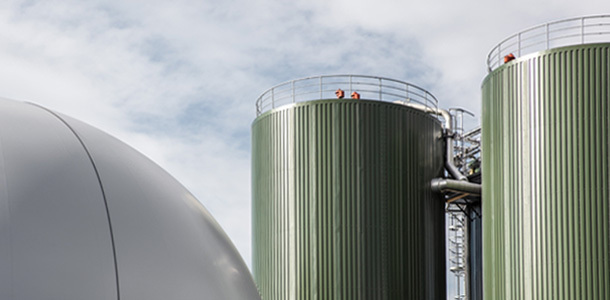About RNG
Produced entirely from organic waste, RNG helps reduce greenhouse gas emissions targeted by the fight against climate change. Distributed in our gas network, RNG has the same energy properties as fossil natural gas and is used for the same applications.
Learn more about RNG production and distribution.

RNG, appropriate energy for the energy transition

A recognized source of renewable energy
RNG is recognized by the Government of Québec as renewable energy. It contributes to Énergir’s greenhouse gas (GHG) emission reduction targets announced in the 2030 Plan for a Green Economy (PGE) and Énergir’s objectives in that respect, namely, a 37.5% reduction in direct and indirect GHG emissions (scope 1 and 2) of its natural gas distribution activities compared to 1990 by 2030.

Reducing fossil-based greenhouse gas
RNG is natural gas from a 100% renewable source that reduces fossil-based greenhouse gas (GHG) emissions in two ways. On the one hand, by using methane from the decomposition of organic waste. On the other, by replacing fossil energy with renewable energy.
To find out more about GNR's GHG emissions, consult our answers here

A complementary energy
RNG can be combined with energy efficiency measures and dual-energy to optimize the decarbonization of distributed energy in buildings.

Supporting the circular economy
RNG can be produced locally and Énergir is working to increase its Québec-based supply of RNG.
RNG production can be an opportunity for municipal governments, farmers and other types of Québec businesses to turn their organic waste into new revenue streams.
The benefits of RNG for your business
Purchasing RNG, which is simple to do and can be tailored to your needs, benefits your business in different ways.

Reduce your SPEDE costs
Unlike fossil natural gas, your RNG purchase is exempt from Énergir’s SPEDE billing.
For more details on the components of your bill, consult the Pricing section.

Easy implementation
No changes to your existing equipment or infrastructure already connected to the gas distribution system.

Determine the amount of RNG purchased in your emissions reporting and quickly improve your company’s fossil GHG balance.
To find out more about GNR's GHG emissions, consult our answers here.
Ready to switch to RNG?
Easily purchase RNG in your Customer Space.
Are you ready to make a minimum five-year commitment? You may be eligible for a grant.
Contact us for more information on available amounts and applicable conditions.
Join the companies that are committed
More and more companies are choosing to purchase RNG, with or without other solutions, to improve their carbon footprint and participate in the energy transition.
ADM Aéroports de Montréal is choosing to purchase RNG to reduce its fossil-based GHG emissions.
Reducing its environmental footprint is a priority for ADM Aéroports de Montréal, and since 2020, it has chosen to purchase renewable natural gas to improve the fossil-based GHG balance of its operations.

Dual-energy electricity and renewable natural gas
By switching to dual-energy electricity and RNG, you are choosing a 100% renewable heating solution.
How does it work?
Your heating system runs on electricity for about 70% of your consumption and gas takes over during periods of extreme cold1. Your purchase of RNG replaces your purchase of fossil natural gas.
Find out more in The Understanding my RNG purchase section
An advantageous decarbonization solution
Dual energy is a solution that ensures you get all the energy you need to heat your building while significantly reducing fossil-based GHG emissions.
In addition, you could benefit from Hydro-Québec’s dual-energy electricity rate and grants2
Talk to your representative
Questions?
We've got answers.
There is no way to confirm the exact amount of purchased RNG that is delivered to your devices, since RNG and fossil natural gas flow through the same gas network and the molecules mix together. The same applies to electricity that is purchased: you can’t tell which dam or wind turbine generated the electrons that are lighting your home.
Énergir has put in place rigorous measures at regular intervals to ensure that its total supply on an annual basis from RNG producers, as a replacement for fossil natural gas, is at least equal to the quantity purchased by all its customers. Following the end of a given year, Énergir has its RNG supply and inventory verified annually by the Bureau de normalisation du Québec (BNQ). The volumes of RNG you purchase are shown on your detailed bills for total natural gas consumption.
Yes, if it’s produced from a renewable source. There are five main sources of renewable energy: the sun, wind, water, the earth (geothermal energy) and organic matter. Organic waste is used in the case of renewable natural gas (RNG). Things like table scraps, wastewater, manure and agricultural slurry all have very short renewal cycles.
To meet regulatory targets for RNG deliveries, Energir sources most of its RNG from producers in North America. It is working to increase its supply from producers in Quebec.
The quantity of RNG purchased by Energir from each producer is injected by the latter into the gas network of the region where the producer is located. It can therefore be injected into the gas network of Energir or another distributor in North America, and then mixed with the fossil natural gas circulating in the same gas network. So, as with its fossil natural gas supply or electricity supply, once the purchased energy is injected into the gas or electricity grid, it is not possible to track the gas molecule or electron. The gas molecule or electron is consumed by the various users connected to these networks.
The quantity of RNG purchased by Énergir reduces the quantity of fossil natural gas that Énergir buys as part of its overall supply. Given that RNG and fossil natural gas molecules circulate in the same gas network and mix without it being possible to distinguish between them, Energir has its total annual supply from RNG producers verified by the Bureau de normalisation du Québec to be at least equal to the quantity of RNG purchased by all its customers, and that the RNG purchased is of 100% organic origin (and does not include any fossil molecules).
RNG combustion is not emission-free; it generates GHG emissions (CO2, CH4 and N2O) in the same way as the combustion of fossil natural gas. CO2 is the main GHG that is generated (over 99% of combustion emissions). However, unlike the emissions resulting from the combustion of fossil natural gas, CO2 emissions from RNG combustion are not included in emissions targeted by the fight against climate change. Fossil natural gas combustion releases CO2 that has been sequestered for millions of years in geological formations. In contrast, the CO2 released into the atmosphere from RNG combustion (known as biogenic CO2) was sequestered in organic matter (food waste, manure, wastewater, etc.) that renews much more rapidly. Biogenic CO2 was therefore in the atmosphere not so long ago, was absorbed by organic matter, and will be re-absorbed. The effect of biogenic CO2 on the climate depends on a variety of factors, including the source of organic waste.
Customers can include their RNG purchases in their GHG inventory. For more details on how to include GHG emissions from RNG combustion in a GHG inventory, see the question above “How are GHG emissions from RNG combustion accounted for?” .
Although also biogenic, N2O and CH4 combustion emissions (less than 1% of combustion emissions) from RNG must be reported in the direct emissions (Scope 1 emissions) of the person or entity using RNG in their GHG inventory.
The biogenic CO2 emitted during combustion must also be quantified, but reported separately from Scope 1 emissions in the GHG inventory. Regulations governing the GHG cap-and-trade system (CATS) stipulate that these CO2 emissions must be reported, but do not have to be covered by emission allowances under Quebec’s GHG cap-and-trade system.
In contrast, all GHG emissions (CO2, CH4 and N2O) from fossil natural gas combustion must be reported in the direct emissions (Scope 1 emissions) of the person or entity using fossil natural gas in their GHG inventory.
RNG production emits GHGs. GHGs are also emitted during RNG transmission and distribution.
Énergir has a regulatory obligation to deliver a minimum amount of RNG during its fiscal year (2% in 2023-2024, 5% in 2025-2026 and 10% in 2030-2031). If customers do not voluntarily purchase a portion of that RNG, Énergir has to socialize the cost of the unsold volumes among customers who do not purchase the minimum quantity required by regulations. Thus, if demand from voluntary customers does not exceed the regulatory threshold regarding the quantity of RNG to be delivered, voluntary purchases will not impact the reduction of GHG emissions in Québec attributable to RNG. Conversely, if voluntary purchases exceed that regulatory threshold, they enable a further reduction of GHG emissions from RNG with respect to Québec.
No modifications to equipment are required since RNG and fossil natural gas are interchangeable. RNG can therefore be used for the same purposes.
Énergir has switched to purchasing renewable natural gas for the buildings it owns. For example, Énergir purchases RNG for its eight regional business offices, its head office, the École de technologie gazière and the LSR plant in an amount equivalent to its consumption of fossil natural gas for these facilities. The same will apply for our future business office in the Eastern Townships, which is currently under construction. This choice directly supports our objective to reduce fossil-based GHG emissions from our facilities and is part of meeting the decarbonization targets for buildings in Québec.
1. When the temperature dips to -12° or -15°, depending on the region.
2. By switching to dual energy, business customers benefit from the dual-energy rate of their electricity provider. The costs and potential savings were calculated based on Hydro-Québec’s small- and medium-power dual-energy rate. The dual-energy rate is in effect during the heating season, from October 1 to April 30. Outside of this period, from May 1 to September 30, electricity prices for dual energy are the same as the base rates (G, M, or G9).
* For more information on the methodology used to calculate greenhouse gas (GHG) emissions reduction data, see our methodology page.



